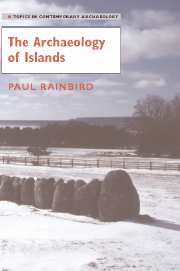Book contents
- Frontmatter
- Contents
- Figures
- Acknowledgments
- 1 A Consciousness of the Earth and Ocean: The Creation of Islands
- 2 Seas of Islands: Anthropology, Biogeography, Archaeology and Postcolonialism
- 3 An Archaeology of the Sea
- 4 The Mediterranean: Malta
- 5 Oceania: Pohnpei and the Eastern Carolines
- 6 The Baltic: Gotland
- 7 Atlantic Archipelago: The Western Seaways of Europe
- 8 Conclusion – Islands and Histories of the Sea
- References
- Index
1 - A Consciousness of the Earth and Ocean: The Creation of Islands
Published online by Cambridge University Press: 03 December 2009
- Frontmatter
- Contents
- Figures
- Acknowledgments
- 1 A Consciousness of the Earth and Ocean: The Creation of Islands
- 2 Seas of Islands: Anthropology, Biogeography, Archaeology and Postcolonialism
- 3 An Archaeology of the Sea
- 4 The Mediterranean: Malta
- 5 Oceania: Pohnpei and the Eastern Carolines
- 6 The Baltic: Gotland
- 7 Atlantic Archipelago: The Western Seaways of Europe
- 8 Conclusion – Islands and Histories of the Sea
- References
- Index
Summary
The geographical study of islands is the study of movement. In their creation, islands may have drifted as pieces of land separated from their continental birthplace. Water may have invaded the once-dry valleys which had previously joined the current island to larger pieces of land. Oceanic islands may have moved rapidly from the ocean floor to emerge above sea level or, as they sink, through the organic growth of coral, the island may be transformed as coral and trapped detritus struggle to maintain a breach in the surface of the water. According to Gilles Deleuze (2004: 11), the movement embodied in islands is the ‘consciousness of the earth and ocean’, a place where the dual elements of the earth's surface are in sharp relief. Oceanic islands would be mountains if not for water; the wet and the dry cannot be separated, but the unstableness of these conditions is often on display.
According to Deleuze, the movement of islands makes them good to think with. They help provide conceptual spaces both for new beginnings and detachment. Additionally, islands are timeless as they are always on the move. Deleuze finds that ‘islands are either from before or after humankind’ (2004: 9). However, this is not an arbitrary space; it is constructed space, a space dreamt of and mythologized. For Deleuze, it is when we no longer understand these myths that literature begins, as it is an attempt to ‘interpret, in an ingenious way, the myths we no longer understand, at the moment we no longer understand them, since we no longer know how to dream them or reproduce them’ (2004: 12).
- Type
- Chapter
- Information
- The Archaeology of Islands , pp. 1 - 25Publisher: Cambridge University PressPrint publication year: 2007

